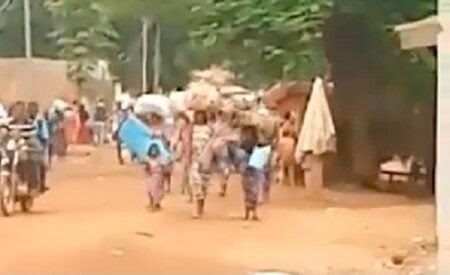More Than Half Of Central Africans In Need Of Humanitarian Assistance – UNOCHA
Violence in the Central African Republic intensified after elections in Dec. 2020, adding to the existing humanitarian crisis.

More than half the population of the Central African Republic, about 2.8 million persons, “are in need of assistance and humanitarian protection,” according to the United Nations Office for the Coordination of Humanitarian Affairs (UNOCHA).
“2.8 million persons, two thirds of whom are in need and risk dying without assistance. This is the first time in five years that this many people are in need, making the Central African Republic one of the most vulnerable countries in the world,” the UNOCHA declares in a recently published document.
The UNOCHA revealed that 388,000 Central Africans have been constrained to move from their homes between Dec. 2020 and March 2021 because of violence which followed the Dec. 27, 2020 presidential and legislative elections and the recurrent clashes between armed groups.
This takes the total number of internally displaced persons in the country to over 727,000 and 695,000 others who are refugees in neighbouring countries.
The UN agency explained that “violence and insecurity have perturbed the principal supply route of the Central African Republic forcing prices of basic commodities to spike by up to 60 per cent.”
In parallel, “the second wave of the pandemic has aggravated the situation by maintaining the high prices on the market.”
Consequently, 2.29 million persons, about 46 per cent of the population, do not have enough to eat and more than half a million of these persons are just a step away from famine, declared the UN humanitarian agency.
The Central African Republic has been plunged into insecurity since 2013 and this is despite several peace accords signed between different factions.
The last accord was signed in Feb. 2019 between the government and 14 armed groups leading to the return of relative calm.
However, there was a resurgence of violence after the Dec. 27, 2020 elections marked especially by the exclusion of the former president Francois Bozize and the reelection of Faustin Archange Touadera for a second five-year term.
Support Our Journalism
There are millions of ordinary people affected by conflict in Africa whose stories are missing in the mainstream media. HumAngle is determined to tell those challenging and under-reported stories, hoping that the people impacted by these conflicts will find the safety and security they deserve.
To ensure that we continue to provide public service coverage, we have a small favour to ask you. We want you to be part of our journalistic endeavour by contributing a token to us.
Your donation will further promote a robust, free, and independent media.
Donate HereStay Closer To The Stories That Matter




